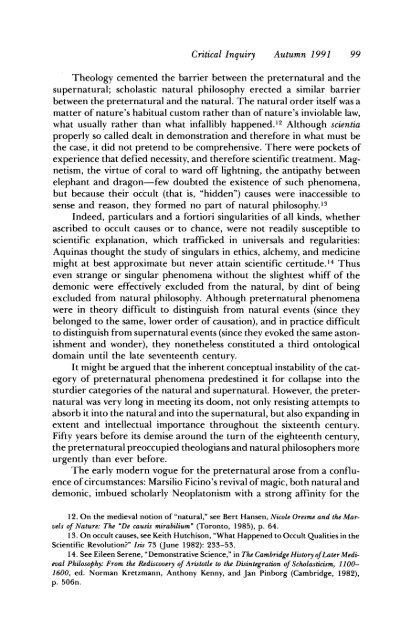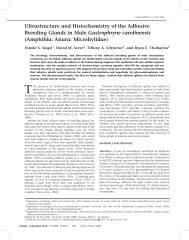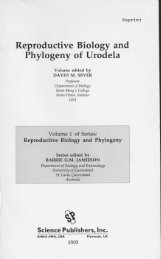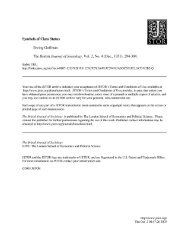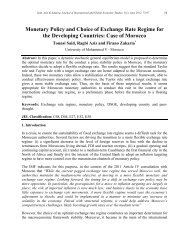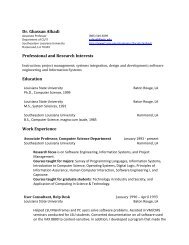Marvelous Facts and Miraculous Evidence in Early Modern Europe ...
Marvelous Facts and Miraculous Evidence in Early Modern Europe ...
Marvelous Facts and Miraculous Evidence in Early Modern Europe ...
Create successful ePaper yourself
Turn your PDF publications into a flip-book with our unique Google optimized e-Paper software.
Critical Inquiry<br />
Autumn 1991<br />
Theology cemented the barrier between the preternatural <strong>and</strong> the<br />
supernatural; scholastic natural philosophy erected a similar barrier<br />
between the preternatural <strong>and</strong> the natural. The natural order itself was a<br />
matter of nature's habitual custom rather than of nature's <strong>in</strong>violable law,<br />
what usually rather than what <strong>in</strong>fallibly happened.12 Although scientia<br />
properly so called dealt <strong>in</strong> demonstration <strong>and</strong> therefore <strong>in</strong> what must be<br />
the case, it did not pretend to be comprehensive. There were pockets of<br />
experience that defied necessity, <strong>and</strong> therefore scientific treatment. Magnetism,<br />
the virtue of coral to ward off lightn<strong>in</strong>g, the antipathy between<br />
elephant <strong>and</strong> dragon-few doubted the existence of such phenomena,<br />
but because their occult (that is, "hidden") causes were <strong>in</strong>accessible to<br />
sense <strong>and</strong> reason, they formed no part of natural philosophy.'3<br />
Indeed, particulars <strong>and</strong> a fortiori s<strong>in</strong>gularities of all k<strong>in</strong>ds, whether<br />
ascribed to occult causes or to chance, were not readily susceptible to<br />
scientific explanation, which trafficked <strong>in</strong> universals <strong>and</strong> regularities:<br />
Aqu<strong>in</strong>as thought the study of s<strong>in</strong>gulars <strong>in</strong> ethics, alchemy, <strong>and</strong> medic<strong>in</strong>e<br />
might at best approximate but never atta<strong>in</strong> scientific certitude.'4 Thus<br />
even strange or s<strong>in</strong>gular phenomena without the slightest whiff of the<br />
demonic were effectively excluded from the natural, by d<strong>in</strong>t of be<strong>in</strong>g<br />
excluded from natural philosophy. Although preternatural phenomena<br />
were <strong>in</strong> theory difficult to dist<strong>in</strong>guish from natural events (s<strong>in</strong>ce they<br />
belonged to the same, lower order of causation), <strong>and</strong> <strong>in</strong> practice difficult<br />
to dist<strong>in</strong>guish from supernatural events (s<strong>in</strong>ce they evoked the same astonishment<br />
<strong>and</strong> wonder), they nonetheless constituted a third ontological<br />
doma<strong>in</strong> until the late seventeenth century.<br />
It might be argued that the <strong>in</strong>herent conceptual <strong>in</strong>stability of the category<br />
of preternatural phenomena predest<strong>in</strong>ed it for collapse <strong>in</strong>to the<br />
sturdier categories of the natural <strong>and</strong> supernatural. However, the preternatural<br />
was very long <strong>in</strong> meet<strong>in</strong>g its doom, not only resist<strong>in</strong>g attempts to<br />
absorb it <strong>in</strong>to the natural <strong>and</strong> <strong>in</strong>to the supernatural, but also exp<strong>and</strong><strong>in</strong>g <strong>in</strong><br />
extent <strong>and</strong> <strong>in</strong>tellectual importance throughout the sixteenth century.<br />
Fifty years before its demise around the turn of the eighteenth century,<br />
the preternatural preoccupied theologians <strong>and</strong> natural philosophers more<br />
urgently than ever before.<br />
The early modern vogue for the preternatural arose from a confluence<br />
of circumstances: Marsilio Fic<strong>in</strong>o's revival of magic, both natural <strong>and</strong><br />
demonic, imbued scholarly Neoplatonism with a strong aff<strong>in</strong>ity for the<br />
12. On the medieval notion of "natural," see Bert Hansen, Nicole Oresme <strong>and</strong> the Marvels<br />
of Nature: The "De causis mirabilium" (Toronto, 1985), p. 64.<br />
13. On occult causes, see Keith Hutchison, "What Happened to Occult Qualities <strong>in</strong> the<br />
Scientific Revolution?" Isis 73 (June 1982): 233-53.<br />
14. See Eileen Serene, "Demonstrative Science," <strong>in</strong> The Cambridge History of Later Medieval<br />
Philosophy: From the Rediscovery of Aristotle to the Dis<strong>in</strong>tegration of Scholasticism, 1100-<br />
1600, ed. Norman Kretzmann, Anthony Kenny, <strong>and</strong> Jan P<strong>in</strong>borg (Cambridge, 1982),<br />
p. 506n.<br />
99


